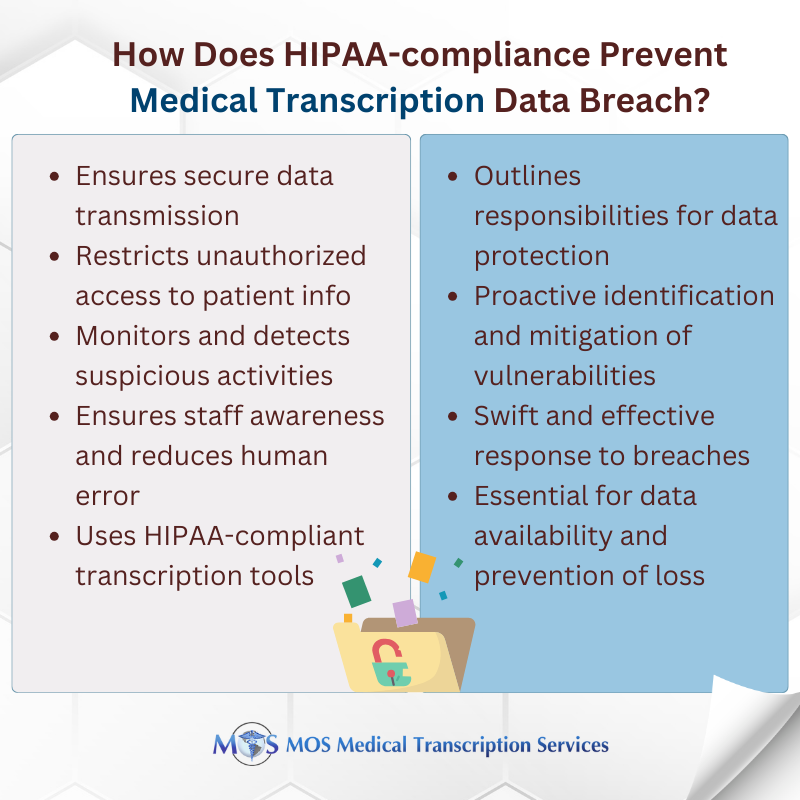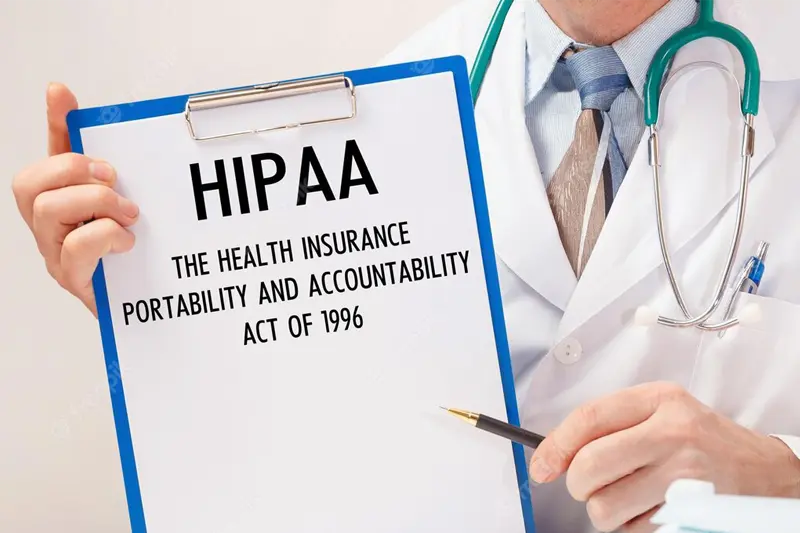
Table of Contents
HIPAA compliance is of paramount importance for any health-related businesses. Any U.S. based medical transcription company must follow these rules, as it serves as a critical framework for safeguarding the confidentiality, integrity, and availability of patients’ health information (PHI). Adherence to HIPAA regulations ensures that sensitive electronic protected health information (ePHI) is handled securely during transcription, preventing unauthorized access, disclosure, or breaches. Compliance with HIPAA rules also helps in building and maintaining trust with healthcare providers, and ensures that patient privacy is prioritized.
For organizations handling sensitive medical data, understanding what counts as a breach is crucial. If there is an unauthorized use or disclosure of protected health information, it is assumed to be a breach unless the organization proves there is a low likelihood of compromise. This is determined through a risk assessment considering factors like –
- the type and amount of information involved
- the risk of re-identification
- who accessed the information without permission
- whether the information was acquired or just viewed, and
- the efforts made to reduce the risk to the protected health information
By implementing robust security measures, encryption protocols, access controls, and comprehensive training for staff, transcription companies can mitigate the risk of data breaches, protect patient rights, and contribute to the overall integrity of healthcare information systems.
Breach Notification Rule among Major HIPAA Rules
HIPAA rules play a crucial role in preventing data breaches in medical transcription by establishing a set of standards and safeguards to protect the confidentiality, integrity, and availability of patients’ health information.
3 main rules of HIPAA are –
- The Privacy Rule
- The Security Rule
- The Breach Notification Rule
Of these rules, the HIPAA breach notification rule outlines mandatory procedures for healthcare organizations to follow in the event of a data breach. It specifically requires HIPAA-covered entities and their business associates to promptly notify individuals affected by a breach of unsecured Protected Health Information (PHI). This rule plays a critical role in clarifying the obligations of covered entities in notifying patients when their PHI is compromised in terms of privacy or security. Even organizations with robust security measures, advanced technology, and well-trained staff can fall victim to security incidents, as acknowledged by the Department of Health and Human Services (HHS), the regulatory body for HIPAA.
HIPAA Measures to Prevent Data Breaches in Medical Transcription

Here are the chief ways in which HIPAA compliance helps prevent data breaches in the context of healthcare transcription:
- Encryption and decryption – HIPAA mandates the use of encryption for transmitting electronic protected health information (ePHI). This ensures that the data is secure during transmission between healthcare providers and transcription companies.
- Access controls – This rule requires implementing access controls to restrict unauthorized access to patient information. Transcription services must ensure that only authorized individuals have access to patient records, and they should implement strong authentication mechanisms.
- Audit trails – The creation and maintenance of audit trails is mandatory, which track access to ePHI. This helps in monitoring and identifying any suspicious activities or unauthorized access attempts, facilitating early detection of potential data breaches.
- Training and awareness – This Act requires regular training of personnel handling ePHI. Transcriptionists and related staff should be educated on security policies and procedures to reduce the risk of human error, and enhance overall awareness of data security.
- Secure transcription platforms – Medical transcription services must use secure and HIPAA-compliant transcription platforms. These platforms should have features such as encryption, access controls, and audit trail capabilities to ensure the secure handling of patient data.
- Business associate agreements (BAAs) – HIPAA also mandates that covered entities establish Business Associate Agreements with third-party service providers, such as medical transcription services. These agreements outline the responsibilities of the business associate in safeguarding patient information.
- Risk assessments – Regular risk assessments are required by HIPAA to identify potential vulnerabilities and risks to the security of ePHI. This proactive approach helps in addressing and mitigating potential threats before they lead to data breaches.
- Incident response plan – The HIPAA Act necessitates the development and implementation of an incident response plan. In the event of a data breach or security incident, having a well-defined plan helps in responding promptly and effectively to minimize the impact and protect patient information.
- Data backups – Regular data backups are essential for ensuring the availability of patient information and preventing data loss. HIPAA encourages the implementation of backup and recovery processes to safeguard against data breaches caused by system failures or cyberattacks.
HIPAA-compliant medical transcription can significantly reduce the risk of data breaches and protect the privacy and security of patients’ health information. Choosing a reliable medical transcription partner is an investment in maintaining the integrity of patient records and upholding the trust placed in healthcare providers.


